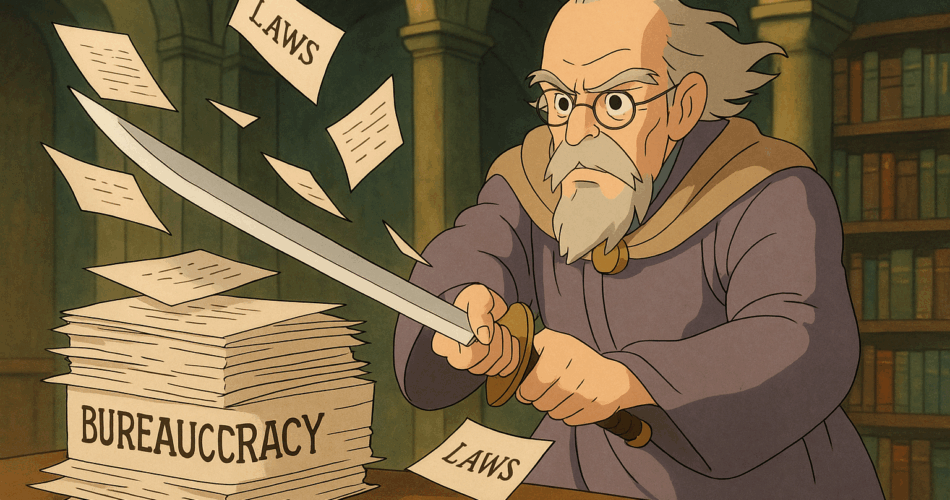In the famous Foundation series by Isaac Asimov, the galactic empire, spanning millions of planets, is depicted as a stagnant and over-centralized system that is crippled by its bureaucracy and excessive legislation. Hari Seldon, one of the main characters and the psycho-historian, had a novel way to tackle this issue. He described the galactic empire as “a machine too large to be managed,” and created the Foundation on Terminus, in a far-flung corner of the galaxy away from the bureaucracy, to look for practical solutions over red tape.
The fact of the matter is that in today’s world, to do paperwork, dedicated bureaucracy has to be hired, and many times the size of the bureaucracy exceeds the number of core professionals that are required to run the organization. A good example is that of NASA. In one of my earlier posts, I had highlighted that what NASA pays its bureaucrats and civil servants cumulatively is at least four times ($1470k v. $333k) more than what it pays to its engineers and full workforce (the real people responsible for running the space program).
But from where does this problem of bureaucracy arise. It arises from excessive legislation. While it’s difficult to pinpoint the exact number of laws worldwide, the total runs into millions or even tens of millions, when including notifications, circulars, rules, regulations, and subordinate legislations. Hundreds of new laws are enacted daily, intended to solve problems, but their sheer volume and overlap have become a problem in themselves, and on top of that, imagine the quantity of bureaucracy that has to be kept in place for implementing these laws. It is truly mind boggling.

Before moving further, we also need to acknowledge that laws are not a cure in themselves. Laws merely signify that as human beings, we are unable to conduct ourselves and we need something to put us on a leash. I find that to be quite troubling. We talk about democracy, freedom, liberty, etc., but when seen in isolation, these concepts have proven to be utterly hollow. There are no ideal circumstances, and even if ideal circumstances were there, they would last only for a moment. It is a constant struggle.
But why is excessive legislation even a problem? More laws mean more regulation, which sounds beneficial at first. However, as the legal stack grows, implementation becomes nearly impossible. Governments, already strained by over-recruitment, lack the personnel to enforce them effectively. To provide perspective, the recent DOGE initiative by Elon Musk and the US Government has shown the world that wastage of humongous proportions of government expenditure takes place when people are hired for unproductive work.
Consider the Affordable Care Act (ACA) of 2010 in the U.S. While its goal of expanding healthcare access is laudable, its complexity has led to immense bureaucratic growth, redundant roles, mismanagement, and rising costs. The law, with its subordinate regulations, runs into tens of thousands of pages, with administration costs exceeding $20 billion annually, clearly creating more problems than it solves. Imagine that money directly going into the pockets of the patients, but sadly, it is not.
Privacy laws are another example. They’re notoriously difficult to implement, often disconnected from reality, and so restrictive that they stifle human thought and innovation. Designed to protect, they instead burden individuals and organizations with impractical rules that are near impossible to follow.
Then we have financial laws relating to cryptos. I think that is a big monster that needs serious trimming. Concerted efforts have been made by the governments all over the world to restrict the growth of cryptocurrencies. What is the result? Cryptocurrencies are going like crazy.
It is not hidden from anyone that most of the governments around the world are immensely incompetent. Compound this problem with the existence of excessive legislations, and it becomes manifold. Imagine the kind of money that could be saved if there is some efficiency in law-making. And it is not even about saving money, a more pressing problem is that due to an unproductive culture, the potential of human resources is wasted and lost.
What is even appalling is that these days, laws are rarely concise. Drafting verbose legislations has become a fashion, just pour out ideas and deal with consequences later. But the truth is that crafting effective laws is an art requiring careful deliberation. Here, it is important to understand that cutting bureaucracy is only part of the solution. The root cause of the problem lies in the duplicity and multiplicity of laws themselves. If laws become streamlined, the need for bureaucrats would automatically decrease. Reducing bureaucracy without addressing the menace of excessive legislation is like treating symptoms without curing the actual disease.
Some suggest that AI could help by predicting legislative trends and pitfalls, much like the psycho-historian, Hari Seldon. But AI alone isn’t enough, it could even worsen things without careful human oversight and consensus on tackling excessive legislation.
Interestingly, Elon Musk when asked about why he left DOGE said that “imagine you’re cleaning a beach which has a few needles, trash, and is dirty. And there’s a 1,000 ft tsunami which is AI that’s about to hit. You’re not going to focus on cleaning the beach.” It is quite a profound observation and hints at the kind of chaotic future we are about to witness. Will the AI be able to solve the problem of excessive legislation on its own? Definitely not. Heavy human intervention and deep thought is required to understand and form a consensus on this issue.
However, all is not lost and there are multiple glimmers of hope. In a decade or so, humans will begin their first bold attempt to actually colonize the planet Mars by sending spaceships. It might take another hundred years or so to establish a colony there of respectable size. Maybe on Mars, the humans/Martians will be able to create a better society with lesser number of laws. But we can’t wait till then.
The first step towards solving a problem is always to acknowledge it. Thus, people should not only be made aware of the problem of excessive legislation, but also the downsides of excessive legislation ought to be shown to them. Even then, in this age of disinformation and misinformation, it is hard for anyone to make people believe that excessive legislation is as big a problem as it is. I will end on an optimistic note here that as and when people realize the extent of this problem, the AI and related technologies will be there to help us and quickly get rid of this menace. Till then, we will just have to understand the magnitude of the problem of excessive legislation and be prepared when the right time comes to eradicate it.


Thankfulness to my father who shared with me on the topic of this
web site, this web site is genuinely awesome.
Thanks a ton! Really means a lot. 🙂